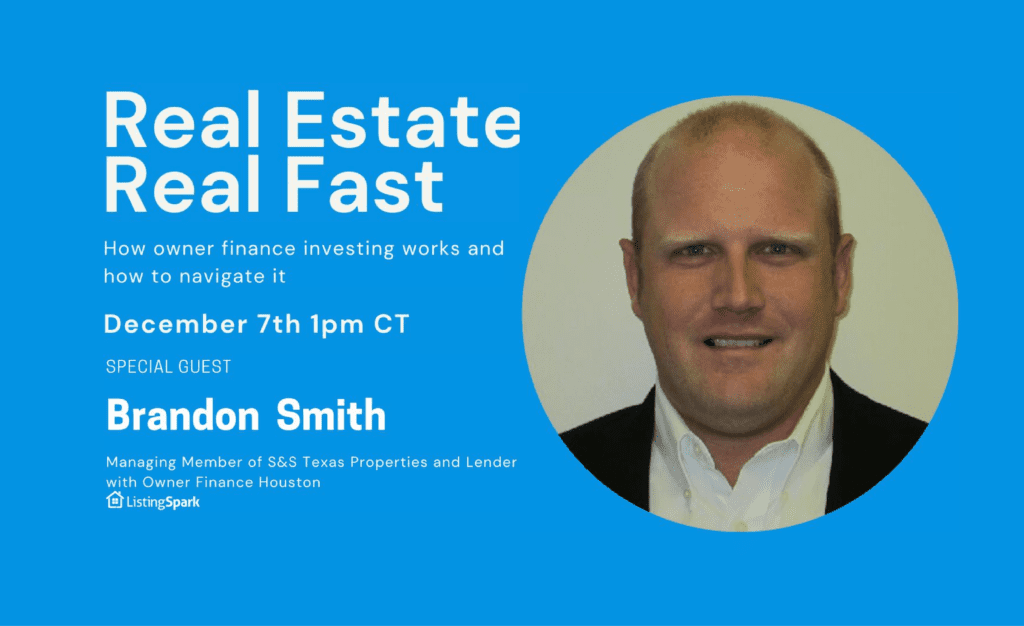
How owner finance investing works and how to navigate it (with Brandon Smith, 13+ years of investing and lending experience) – Real Estate Real Fast EP9
Episode overview
Investing in owner financing can be a great way to build wealth and generate passive income.
However, navigating the complicated process of finding and closing these deals isn’t easy.
Brandon Smith, who has over 13 years of investing and lending experience, specializes in owner financing and has developed a successful system for sourcing deals and minimizing risk.
In this episode, we’ll learn more about his approach, how he finds and closes deals, and best practices for working with banks and private investors.
Episode highlights
- How owner financing typically works
- How to qualify buyers so that you have a low default rate on owner financing deals
- Why some buyers can’t qualify for more traditional financing
- What are the pitfalls and roadblocks you should avoid if you want to get into owner financing
- What are the key paperwork and terms you need to be aware of to execute owner financing
- What tools and services investors should use if they want to get into owner financing
- How Brandon sources his owner financing deals
- Why owner financing strategy is changing with the changing market
- What to expect in the real estate market at the end of 2022
- What kind of banks should you use to execute owner financing deals
- Where can you find good sources of lending
- Where to learn about owner financing
Episode links:
- Follow ListingSpark on LinkedIn, Twitter, Instagram, Facebook, TikTok and YouTube
- Connect with Aaron Jistel on LinkedIn
- Connect with Brandon Smith on LinkedIn
Key takeaways
[00:03:41] How owner financing typically works
Owner financing is a complicated niche that involves taking over someone’s payments. It usually involves wrapping the existing mortgage and obtaining title insurance from a title company. Hard deeds involve taking the note to a local community bank and living off the cash flow in between, which means making money off the difference in interest rates between the bank loan and the borrower’s loan.
“We’re just more of a hard deed true note type of situation. So when we go and close there’s a lender of record on that file. And the RMLO has already been produced to the borrower.
So they have a 64 page packet with the RMLO and then at closing, I physically buy the note. And that’s kind of where I go buy the note and we take it to our local community bank and then we’re living off the cash flow in between.”
[00:05:38] How to qualify buyers so that you have a low default rate on owner financing deals
To ensure Brandon’s owner financing deals have a low default rate, he uses a licensed RMLO to underwrite the borrowers and makes sure their income can be verified. The RMLO delivers an extensive document of 64 pages to make sure he only picks the right buyers.
“Currently we use an RMLO. They’re the ones that are actually doing the borrower underwrite and giving me the decision as a note buyer, ‘Hey, these people will be able to pay their note.’
You know, it’s, it’s about matching income assets. A lot of these folks don’t have the liabilities that a true traditional borrower has. So if we can connect that the income that they’re getting is going into, you know, a traditional, whether it’s a bank account or even a tax return where we can verify the income and, and maybe even get an employment letter or whatever it may be then we’re able to make sure that our default rate is low.”
[00:07:03] Why some buyers can’t qualify for more traditional financing
The number one reason why buyers can’t qualify for a conventional FHA, VA or other loan is their credit history. This is especially true for those who have recently arrived in the U.S., as they may not have had time to establish a good credit score.
“Well, mainly social security is probably the number one. Then it’s credit history. They might have just come to the states. And my number one borrower as far as if you wanted to, you know, like an avatar type person—It’s somebody that’s come here to the states. They have a traditional family, they’re working hard, and they’re paying their taxes.”
[00:07:45] What are the pitfalls and roadblocks you should avoid if you want to get into owner financing
When doing a wrap, the hardest part is getting insurance in order to satisfy due on sale calls. When buying a note, the hardest part is having the capital to get out of it, usually through banks that carry your paper.
“If you’re doing a wrap, the number one thing is insurance. Because if you’re gonna take over that mortgage in a wrap situation and that’s at a Chase bank or whatever it may be they more than likely they have a due on sell call.
As far as doing what I do, the hardest part of what I do is when we take a note, when I’m a note buyer is having the backend long capital, you have the capital that’s gonna get you out.”
[00:08:56] What are the key paperwork and terms you need to be aware of to execute owner financing
Having documents that are not compliant with Dodd-Frank regulations and other laws can make it difficult to sell a note. To ensure compliance, it’s important to get an under contract, verify income and down payment, and have the borrower go to an RMLO to get a full underwrite. Additionally, when doing a sub-two transaction, it’s important to make sure that insurance is kept up to date on the property.
“So obviously you know, back in 2009 and 2010 when we started doing owner finance and the markets, you know, you couldn’t flip a house or anything. You could rent ’em or you could owner finance them. You know, we could just, we could just do a deed of trust. We closed out at a local title company.
All that is good. But all that changed with, you know, obviously Dodd-Frank compliance. And so we had a lot of shifting and changing. We went away from owner finance cause we were trying to figure out the laws, but we were talking to our attorneys and whatever it may be.”
[00:12:05] What tools and services investors should use if they want to get into owner financing
When investing in owner financing, it is important to use loan servicing to make sure taxes and insurance are up to date, as well as keeping track of payments. Two popular companies for loan servicing are Mills out of El Paso and August REI out of Dallas. Both offer bilingual services which are helpful in this space.
“Loan servicing is obviously a big deal. It’s not a requirement. You can service your own loans, you can have people send payments to you directly. But anytime that I have a client that is looking to get into owner financing, I typically recommend loan servicing, which seems to be worth every penny you’re gonna spend on utilizing those services. Just to make sure the stuff—taxes, insurance and tracking those payments and things like that are all in place.”
[00:14:43] How Brandon sources his owner financing deals
Brandon sources his deals directly from sellers, using a combination of direct mail marketing, networking, and TV advertising. He also has a banking line of credit set up with either a local community bank or hard money lender to be able to close quickly. He is typically at 75% LTV in good neighborhoods, and 70% in more speculative areas.
“We’re seller direct. We’ve always been, you know, belly button to belly button. You know, I used to be, for many years I was a part of a big yellow. We left home investors probably seven years ago, a long time ago. But basically, you know, we do seller direct marketing.
We were on TV here in Houston as well. So the inbound side we’re heavy on direct mail. Obviously our networking since we’ve been around here for so long. You know, people know that we have cash to close and can traditionally close pretty quick.”
[00:16:40] Why owner financing strategy is changing with the changing market
In order to adjust to the new market, Brandon is taking more conventional buyers and allowing other financing options in his listings. Since rates have been hiked, the challenge is that it’s difficult for borrowers to afford the monthly payments. To combat this, Brandon is building relationships with community banks and showing them my track record of success in order to secure better rates.
“The downslide here is that we are seeing some slowdown in conventional FHA. You know, six months ago when we did a listing, I would only do a listing in owner finance, but now I’m having to, you know, bring conventional buyers back. So we are allowing other financing in place. You know, we used to not allow that, but now we are just to get the houses moved.”
[00:19:56] What to expect in the real estate market at the end of 2022
Rates have gone down a little bit, which has helped. Consumer confidence is slowly starting to come back a bit, but the bond market is tanking a bit as well. If the Fed can get rates to sub-six percent and consumer confidence continues to improve, we could see more activity in the real estate market in the next 12-24 months. However, it is still a bit of a crystal ball out there and none of us know exactly what will happen.
“I think what people are doing right now is they’re keeping inventory down. Because right now if you’re sitting on a three to 4% interest rate and you don’t have to move, you’re not moving and you got equity. And unless you’re in an emergency and, you know, could be an emergency life event, could be a divorce, could be a job, relocation. Those are really the majority of the houses that we’re seeing hit the market.”
[00:24:03] What kind of banks should you use to execute owner financing deals
The best way to get banks to back up notes is to start small and build relationships with local community banks. Show that you are a competent operator and make payments on time so that the bank trusts you. Once they do, they will be more likely to offer bigger lines of credit. Capital brokers can also help establish lines of credit.
“You don’t always have to start with this, you know 5-10 million line of credit. Start out with enough to get one or two deals and show that you’re a competent operator in this space. And pay those loans back. And then typically, once those banks feel like you’re a safe borrower, they’re gonna be knocking on your door.”
[00:26:51] Where can you find good sources of lending
Private capital can be found through networking groups and self-directed IRAs offered by companies like Quest IRA. Private investors and partners may be willing to lend money for both the front-end and back-end of real estate projects. It is important to have a strong capital commitment when looking for bank loans.
“Finding good networks is a great way for anybody to start building relationships and find capital. If you find a good enough deal, you’re always gonna be able to find the money if you’re looking hard enough.”
[00:29:47] Where to learn about owner financing
When it comes to owner financing, a great resource is Mitch Stevens out of San Antonio. He has a lot of books and is active on Facebook. Eddie Speed is another great resource as he is more on the creative side and likes wraps.
“Mitch Stevens out of San Antonio has a ton of books and he’s active on Facebook. But more importantly, you gotta be able to do the deal, understand the structure, and work with your title company that will do an owner finance transaction.”
Related Posts
The Best Flat-Fee MLS Listing Service: Going Beyond the Basics
Modern technology has the power to transform how we get things done, and the real estate industry is no exception. One example of this evolution is the rise of flat-fee MLS listing services. This technology…
From NAR to FSBO: How the Settlement Shifts Real Estate
The recent settlement between the National Association of Realtors (NAR) and the U.S. Department of Justice represents a seismic shift in the real estate market. The settlement addresses the effects of tying listing and buyer’s…
How Do You Sell a House Without a Realtor in Georgia?
If you’re curious about how to sell your own house without a realtor in Georgia, you’re in the right place. Let’s break it down simply: Selling your home without a realtor can save you money on commissions…




